Wondering if your sugar intake is a problem? Here are eight subtle signs that your body is secretly (or not so secretly) addicted to sugar, plus eight things you can do about it.
The reality is that humans are neurologically wired to be addicted to sugar. Evolutionarily speaking, sugar was mostly available in the summertime (in the form of fruit), when we would gorge on it to literally “fatten up” for the winter. Going into winter with excess calories stored in the form of body fat was what allowed our ancestors to survive through the cold winter seasons.
We are wired to seek out sugar as a survival mechanism. But in our modern world, sugar is available year-round, 24/7. Sugar is ubiquitous these days, particularly in processed foods, but also in healthy Paleo foods like fruits and tubers.
Suffering from Diabetes or blood sugar imbalance?
Grab our FREE Paleo & Diabetes Guide
The Top 4 Problems with Sugar
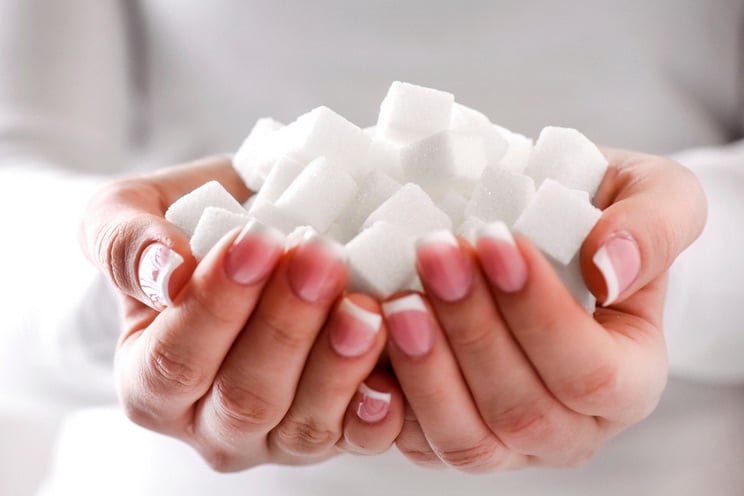
In short, the top four problems with our modern day sugar consumption are:
Excess Sugar in Our Diets
All carbohydrates (and most proteins) break down into sugar (aka glucose). An excess of carbohydrates in the diet is likely a major contributor to sugar addiction, obesity, and chronic disease. (1) In fact, the shift in our macronutrient ratios away from fats and towards carbohydrates may be the single biggest contributing factor to the current obesity and chronic disease epidemic. (2)
Too Much Sugar in One Sitting
Eating carbohydrate-rich foods like breads, noodles, chips, candies, pop, fruit, starches, and juices causes our blood sugar levels to spike, followed by a drop. Our bodies perceive this drop as dangerous, causing our adrenal glands to release cortisol, thereby triggering more sugar cravings in a vicious cycle. (3) Feeling light-headed, grumpy, tired, shaky, or ravenously hungry are all indications that you’re riding the blood sugar roller coaster – a ride that can result in hypoglycemia, insulin resistance, and type 2 diabetes.
Artificial Sugars
Unfortunately, many sugar-free alternatives are made to taste sweet by use of chemicals that come with a host of health concerns and can also perpetuate sugar addiction. They might not spike blood sugar, but their sweet taste can still instigate an insulin response. (4) Not only can artificial sugars cause direct damage to the liver, they are also readily stored as body fat because our bodies are simply not designed to metabolize these foreign chemicals and don’t know what to do with them. (5)
Refined Sugars
Sugar that has been processed and refined spikes our blood sugar levels fast and hard, which is damaging to the blood vessels and can lead to inflammation, dysbiosis (bacterial overgrowth), insulin resistance, and a long list of unfavorable outcomes. (6) Since refined sugars have no real nutritional value, when we eat them, our body craves them more because we are not receiving the nutrients we need from the food we’re eating. (7) This sets up a vicious cycle where we eat more and more of these foods in a subconscious effort to get our nutritional needs met.
8 Signs Your Body Is Addicted to Sugar
If you experience any of these signs of sugar addiction, here are simple fixes to get you back on track.
1. You Feel The Need To Eat Or Snack All Day Long
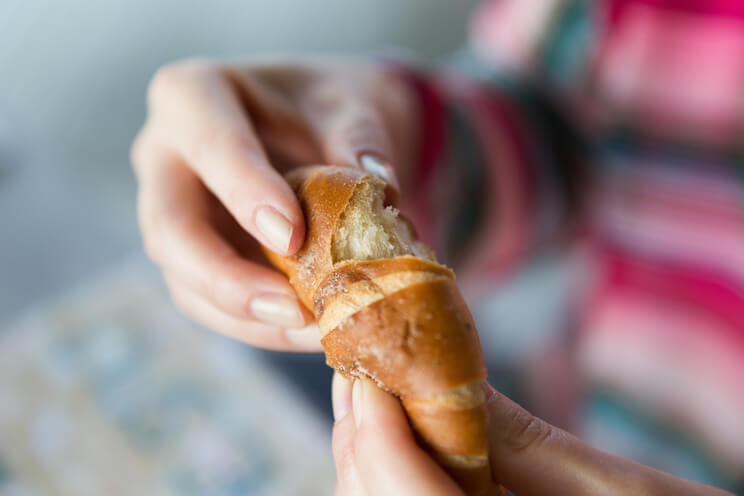
If you find yourself mindlessly snacking throughout the day (whether or not you’re actually hungry), you may be secretly addicted to sugar. Frequent snacking can also be a sign that you’re riding the blood sugar roller coaster.
The solution: Focus on eating a combination of the three macronutrients (fats, proteins, and carbohydrates) at every meal or snack. Never eat carb-rich, sugary foods in isolation.
2. You Eat A Lot Of Fruit Or Drink A Lot Juice
Don’t let it fool you – fruit is sugar too! Fruit juices are particularly high-glycemic and if you frequently crave or eat fruit, it could be a sign of an underlying sugar addiction.
The solution: Focus on fruits that give you more bang for your buck, that is, more nutrients with less sugar. Berries are chock-full of antioxidants and other beneficial phytochemicals while containing less sugar than most other fruits. If you drink juice, make sure it’s fresh green juice coming from mainly vegetables.
3. You’re A Coffee Hound And Crave Sugary, Alcoholic Drinks
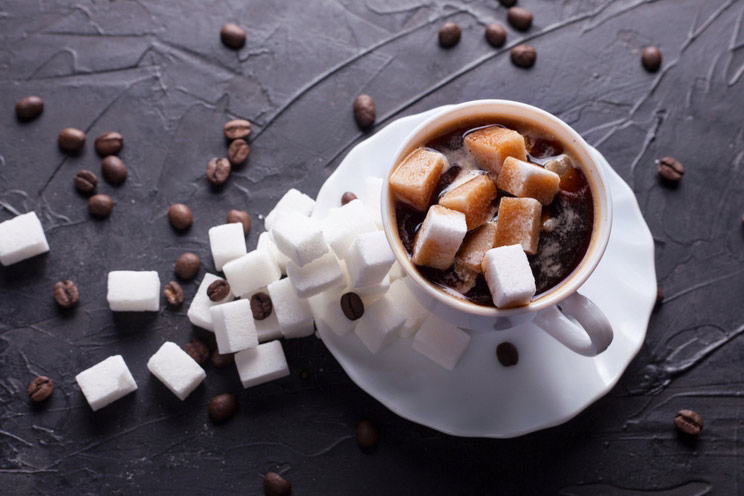
The sweeteners and mixers used in coffee and alcoholic drinks can contribute substantially to sugar intake. Many people who quit drinking alcohol or coffee find themselves craving other sources of sugar to replace what’s been lost from these drinks.
The solution: Add fat to your coffee (like coconut oil, grass-fed ghee, or MCT oil) and skip on the honey and other coffee sweeteners. Be sure to drink alcohol in moderation, and skip on the dark-colored liquors, mixers, and beer, which are all loaded with sugars.
4. You’re Chronically Stressed Out
Ongoing stress causes blood levels of the adrenal gland hormone cortisol to become consistently elevated. Cortisol promotes hunger and sugar cravings, and likewise, eating sugar can spike cortisol levels. (8) If stress is unrelenting, the adrenal glands may eventually tire out, leading to depressed cortisol levels and adrenal fatigue, which can further trigger sugar cravings and addiction.
The solution: Learn to retrain your stress response by practicing breathing through your nose and belly breathing techniques. Try not to eat when you’re stressed out – take a walk instead.
5. You Crave Sugar During Or After Meals
If you can’t get through dinner without thinking about dessert, there’s a good chance that you’re addicted to sugar! Craving sweets during or immediately after a meal can be a symptom of adrenal fatigue, SIBO (small intestinal bacterial overgrowth), and sugar addiction.
The solution: If you think you may have adrenal fatigue, there are saliva tests that can confirm it. If you suspect you have SIBO or another form of dysbiosis, there are breath, urine, and stool tests that can reveal hidden causes of infection that could be contributing to relentless sugar cravings.
6. Hunger Hits You Like A Brick Wall

If your hunger comes on suddenly, urging you to eat immediately or else, you could be suffering from hypoglycemia, or bouts of low blood sugar. Riding the blood sugar roller coaster makes us crave sugary foods when our blood glucose drops, and hypoglycemia becomes a health hazard when blood sugar levels plummet too low.
The solution: Eat a protein and fat at every meal and snack, especially if you’re eating carbohydrates. Don’t ever eat carbs in isolation (e.g., smear some nut butter on that piece of fruit!).
7. You Crave Carbs In The Morning (or Late At Night)
Eating a carbohydrate-rich breakfast can send you riding the blood sugar roller coaster for the rest of the day, resulting in frequent hunger and sugar cravings.
Craving something sweet first thing in the morning, in the middle of the night, or when you wake up from a nap may be a symptom of a secret sugar addiction, hypoglycemia, or low adrenal function.
The solution: Eat a protein-rich breakfast that contains healthy fats and non-starchy vegetables. Eating your starches with dinner, however, can help to promote sleep and weight loss.
8. Cravings For Sugar Increase The Longer You Go Without It
Going sugar-free is a great way to quickly come to terms with just how addicted you actually are. Try giving up sugar for a few days and see how you feel – the more frequent and intense the cravings, the more addicted you probably are.
The solution: Eating Paleo helps to naturally balance glucose levels by providing a healthy macronutrient ratio and focusing on low-glycemic carbohydrates to help maintain steady blood glucose control throughout the day.
The Bottom Line
If you’re addicted to sugar, don’t beat yourself up. Remember, we are all neurologically wired to be addicted to sugar.
Quitting sugar cold turkey can lead to some uncomfortable side effects. Many people do best with gradually overcoming sugar addiction by fueling their bodies with the foods that nature intended us to eat.
The Paleo diet advocates for a return to natural sources of sweetness, coming from a moderate amount of fruit and some sweet and starchy vegetables. It may take some time, but eventually your taste buds will adapt to having less sugar. Fruit will start tasting super sweet to you!
If you try to eat refined or artificial sugars after you’ve been Paleo for a while, you may be in for an unpleasant surprise. They may taste too sweet and/or like chemicals, and they may even make you sick. I threw up the first time I drank a pop after eating Paleo for a few years, and I used to drink soda every day!
It may not seem like you’re getting enough sweetness on your Paleo diet (at first), but be patient as your taste buds evolve. You’ll be astounded at how much you’re able to cut back on sweeteners and sugar in your life, once you’ve given your taste buds a chance to reorient themselves. And in case you’re wondering, yes – there are Paleo-friendly sweeteners – just keep them in moderation.
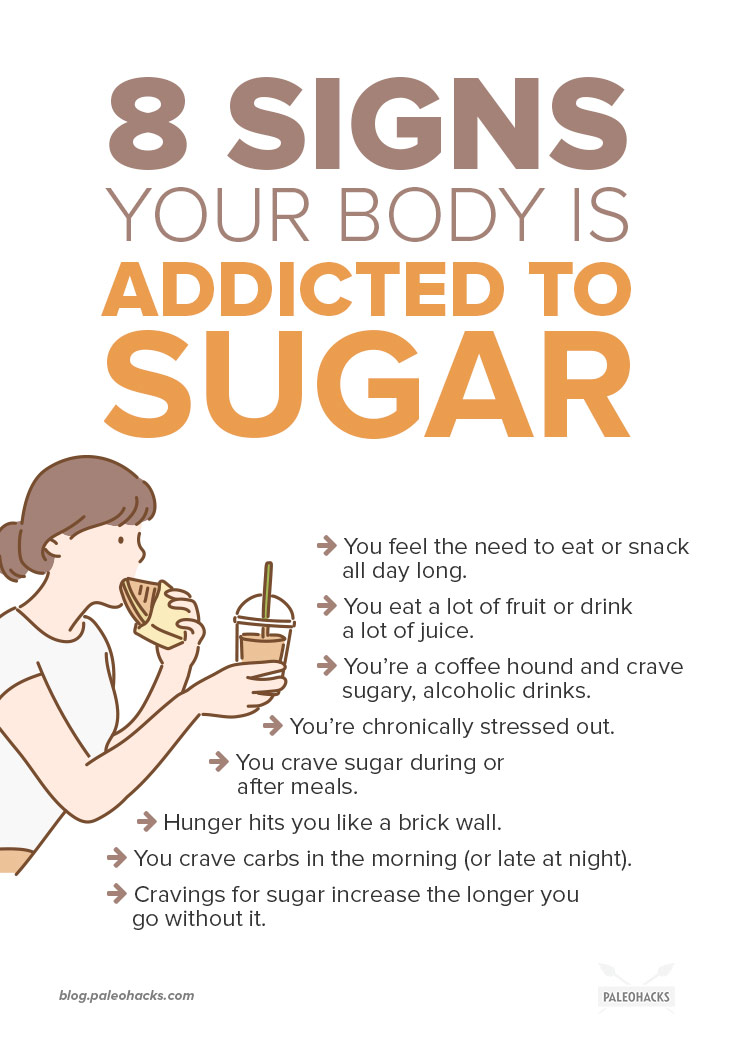
In good health,
Kinsey Jackson, MS, CNS®
PaleoPlan Nutritionist
(Read This Next: What Is Sugar Alcohol and Is It Better Than Sugar?)


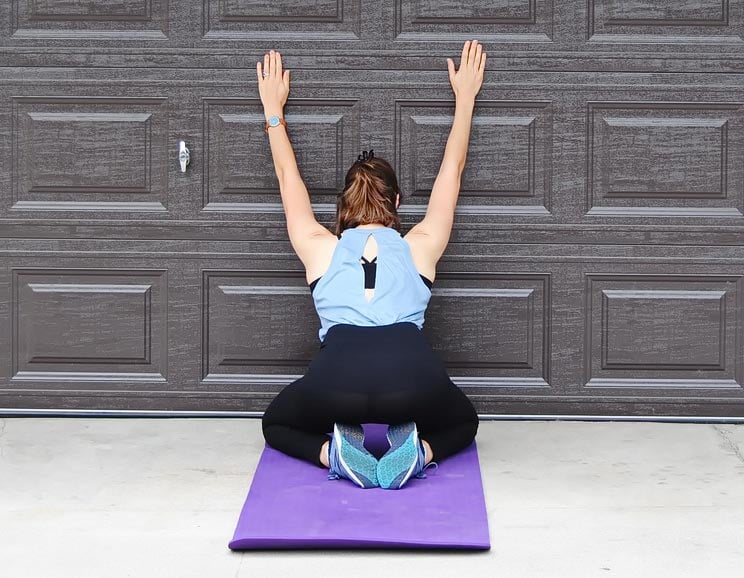 8 Dynamic Stretches for Chilly Mornings (Ease Stiffness and Achy Joints)
8 Dynamic Stretches for Chilly Mornings (Ease Stiffness and Achy Joints)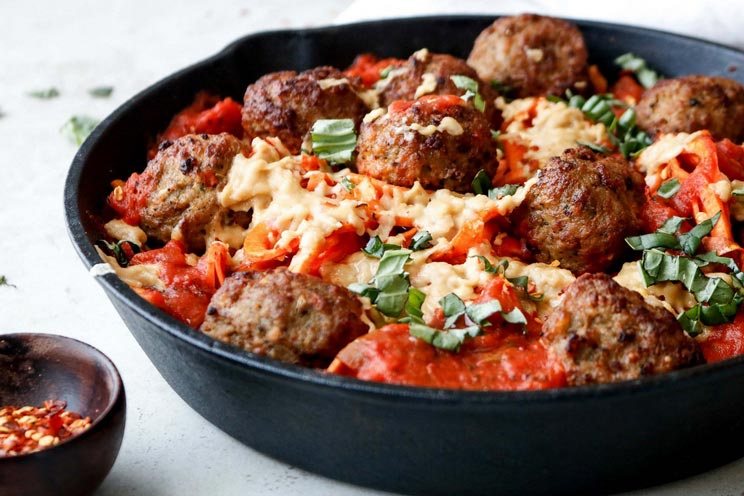
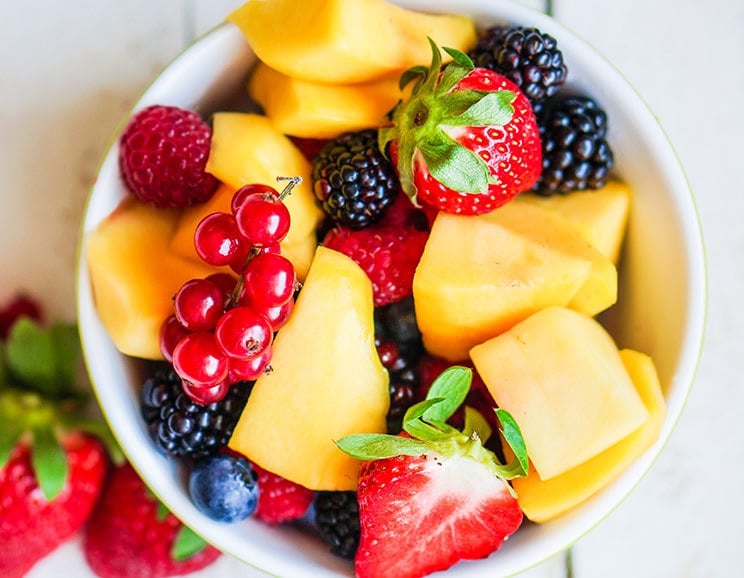


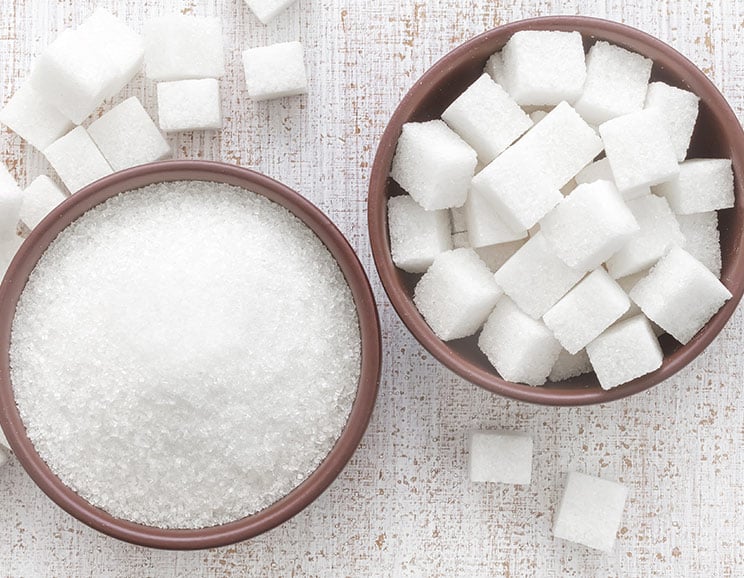
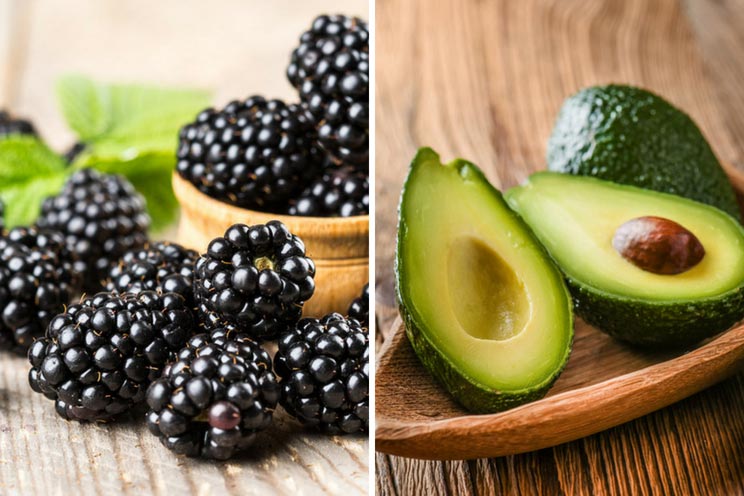
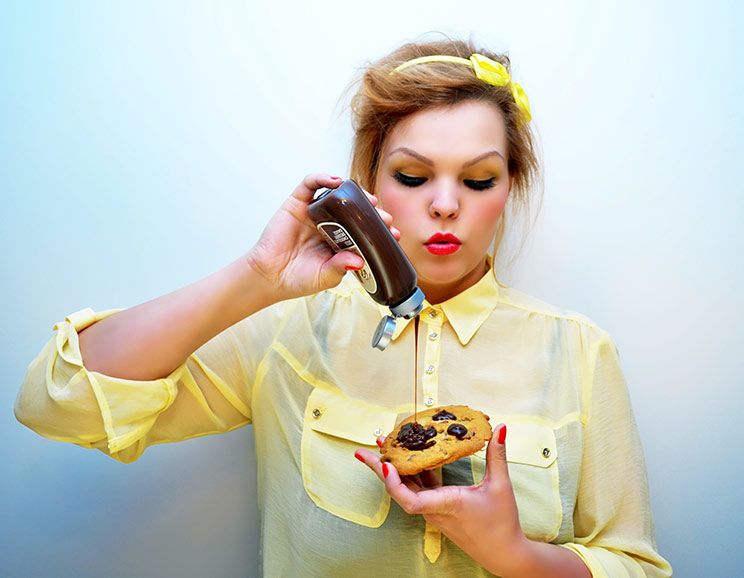
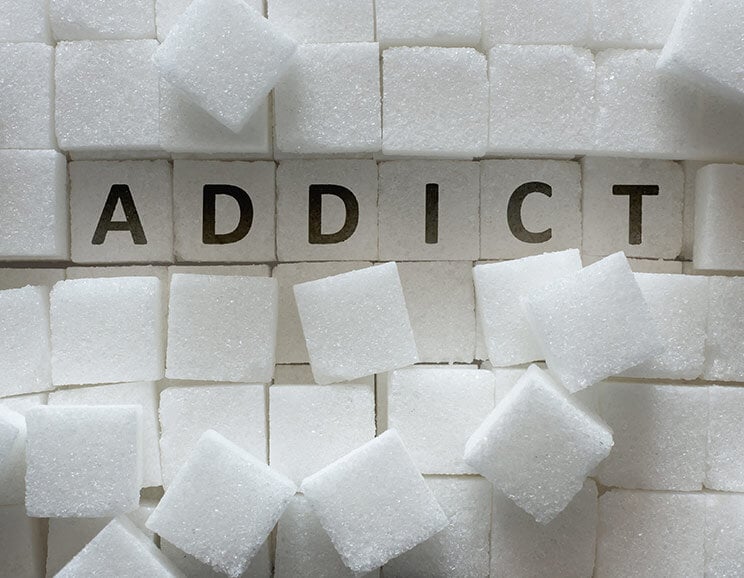

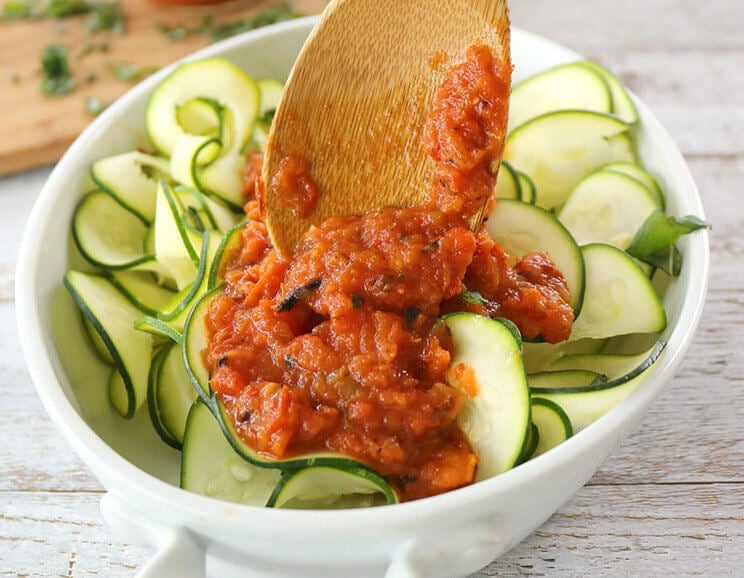
Show Comments